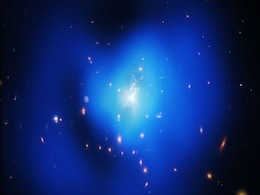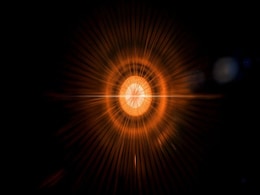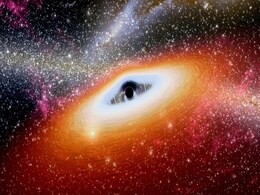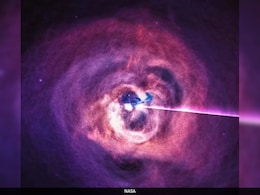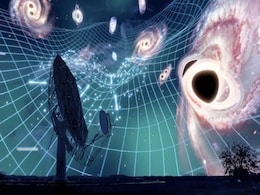Black Holes In Universe
- All
- News
- Videos
-

Did Black Hole Radiation Shape the Universe?
- Saturday March 29, 2025
- Written by Gadgets 360 Staff
A study suggests that Hawking radiation, first proposed by Stephen Hawking, may have influenced the universe’s structure. According to reports, primordial black holes that existed in the early universe could have evaporated through Hawking radiation, impacting matter distribution. The research explores how these black holes might have shaped gala...
-
 www.gadgets360.com
www.gadgets360.com
-

Black Hole Hunter Priyamvada Natarajan Searches For The Unseen Universe
- Monday February 24, 2025
- Science | Reported by Pallava Bagla, Edited by Aastha Ahuja
Black holes are a place in the universe where gravity is so intense that not even light can escape.
-
 www.ndtv.com
www.ndtv.com
-

Astronomers Discover Largest Collection of Missing Link Black Holes in Dwarf Galaxies
- Thursday February 20, 2025
- Written by Gadgets 360 Staff
Astronomers have uncovered 2,500 dwarf galaxies containing active black holes using DESI data. This marks the largest-ever discovery of intermediate-mass black holes, with 300 new candidates identified. These findings could help scientists understand how black holes evolve from stellar-mass to supermassive sizes. The research, based on 410,000 gala...
-
 www.gadgets360.com
www.gadgets360.com
-

JWST Identifies Cooling Gas in Phoenix Cluster, Unlocking Star Formation Process
- Thursday February 20, 2025
- Written by Gadgets 360 Staff
The James Webb Space Telescope has detected the missing cooling gas in the Phoenix Cluster, a galaxy cluster located 5.8 billion light-years away. Researchers used the Mid-Infrared Instrument (MIRI) to identify gas at around 540,000 degrees Fahrenheit trapped in cavities within the cluster. This discovery resolves a long-standing mystery of how sta...
-
 www.gadgets360.com
www.gadgets360.com
-

Scientists Detects Most Energetic Neutrino Ever in the Mediterranean Sea
- Friday February 14, 2025
- Written by Gadgets 360 Staff
A record-breaking neutrino with 220 quadrillion electron volts has been detected in the Mediterranean Sea. Captured by the KM3NeT deep-sea telescope, this rare cosmic event could be linked to powerful astrophysical phenomena such as black holes or supernovae. Neutrinos, nearly massless particles that rarely interact with matter, provide crucial ins...
-
 www.gadgets360.com
www.gadgets360.com
-

Astronomers Find a 200,000-Light-Year Black Hole Jet in the Early Universe
- Monday February 10, 2025
- Written by Gadgets 360 Staff
Astronomers have identified the longest black hole jet observed in the early universe, stretching 200,000 light-years—twice the Milky Way’s width. Found in quasar J1601+3102, this jet was detected using the LOFAR telescope. Despite the black hole being 450 million times the Sun’s mass, it isn’t among the most massive. Scientists believe env...
-
 www.gadgets360.com
www.gadgets360.com
-

JWST Detects Unexpectedly Massive Black Holes in the Early Universe
- Monday February 3, 2025
- Written by Gadgets 360 Staff
A new study led by Jorryt Matthee of ISTA reveals that black holes in early galaxies were significantly more massive than expected. Using JWST data, researchers found that some black holes accounted for nearly 10% of their galaxy's stellar mass—far exceeding the 0.01% ratio seen in modern galaxies. The findings challenge existing growth models, s...
-
 www.gadgets360.com
www.gadgets360.com
-

Hear The Universe Roar: NASA Reveals Haunting Audio From A Supermassive Black Hole
- Tuesday January 28, 2025
- Science | Edited by Nikhil Pandey
NASA has released an eerie audio clip of sound waves emanating from a supermassive black hole in the Perseus galaxy cluster, 250 million light-years away.
-
 www.ndtv.com
www.ndtv.com
-

Astronomers Spot Hundreds of Hidden Supermassive Black Holes Using Infrared
- Tuesday January 21, 2025
- Written by Gadgets 360 Staff
Hundreds of hidden supermassive black holes have been identified using infrared observations, offering fresh insights into their role in galaxy formation. Researchers relied on data from NASA's Infrared Astronomical Satellite (IRAS) and the Nuclear Spectroscopic Telescope Array (NuSTAR) to detect emissions from black holes obscured by thick clouds ...
-
 www.gadgets360.com
www.gadgets360.com
-

Hidden Supermassive Black Holes Found Behind Gas and Dust Across the Universe
- Thursday January 16, 2025
- Written by Gadgets 360 Staff
Supermassive black holes, which feed on surrounding material, may be more common than earlier believed. Researchers suggest that nearly 30%-50% of these black holes could be concealed behind dense gas and dust, making them invisible to standard telescopes. The study, based on infrared observations, sheds light on how these entities influence star f...
-
 www.gadgets360.com
www.gadgets360.com
-

MeerKAT Detects Gravitational Wave Background, Uncovering Cosmic Activity
- Friday December 27, 2024
- Written by Gadgets 360 Staff
Scientists using the MeerKAT Pulsar Timing Array have made a groundbreaking discovery, confirming the presence of a gravitational wave background in the universe. This unexpected phenomenon, detected with unprecedented precision, suggests that supermassive black hole collisions may occur more frequently than previously thought. By observing the sig...
-
 www.gadgets360.com
www.gadgets360.com
-

Researchers Propose Evidence of Primordial Black Holes in Cosmic Objects and Earthly Materials
- Thursday December 5, 2024
- Written by Gadgets 360 Staff
A study led by the University at Buffalo suggests primordial black holes (PBHs), formed in the early universe, could leave traces in both cosmic and terrestrial objects. Researchers believe PBHs, which are much smaller than stellar black holes, might leave hollow structures in celestial bodies like asteroids or moons. Additionally, passing through ...
-
 www.gadgets360.com
www.gadgets360.com
-

James Webb Telescope Breaks Record with Discovery of Early Galaxies Dating 200 Million Years After Big Bang
- Wednesday December 4, 2024
- Written by Gadgets 360 Staff
The James Webb Space Telescope has spotted five galaxy candidates dating back to 200 million years after the Big Bang. These findings could transform our understanding of early cosmic evolution. Discovered via gravitational lensing, these galaxies, if confirmed, predate known formations and offer vital insights into the universe’s infancy. Scient...
-
 www.gadgets360.com
www.gadgets360.com
-

Researchers Propose New Methods to Spot Atom-Sized Primordial Black Holes Moving Across Solar System
- Thursday November 28, 2024
- Written by Gadgets 360 Staff
Recent studies suggest that microscopic primordial black holes may exist within the solar system, potentially impacting planetary orbits and satellite movements. These small, early-universe black holes could also contribute to the mystery of dark matter, which makes up 85% of the universe's mass. Methods are being developed to detect their gravitat...
-
 www.gadgets360.com
www.gadgets360.com
-

Cosmic Survey Reveals Surge of Black Holes in Dwarf Galaxies
- Saturday November 16, 2024
- Written by Gadgets 360 Staff
A cosmic survey using the Dark Energy Spectroscopic Instrument has identified over 2,500 active black holes in dwarf galaxies, tripling previous estimates. Conducted by the University of Utah’s Ragadeepika Pucha, the research has also uncovered nearly 300 intermediate-mass black holes, quadrupling their known population. This milestone discovery ...
-
 www.gadgets360.com
www.gadgets360.com
-

Did Black Hole Radiation Shape the Universe?
- Saturday March 29, 2025
- Written by Gadgets 360 Staff
A study suggests that Hawking radiation, first proposed by Stephen Hawking, may have influenced the universe’s structure. According to reports, primordial black holes that existed in the early universe could have evaporated through Hawking radiation, impacting matter distribution. The research explores how these black holes might have shaped gala...
-
 www.gadgets360.com
www.gadgets360.com
-

Black Hole Hunter Priyamvada Natarajan Searches For The Unseen Universe
- Monday February 24, 2025
- Science | Reported by Pallava Bagla, Edited by Aastha Ahuja
Black holes are a place in the universe where gravity is so intense that not even light can escape.
-
 www.ndtv.com
www.ndtv.com
-

Astronomers Discover Largest Collection of Missing Link Black Holes in Dwarf Galaxies
- Thursday February 20, 2025
- Written by Gadgets 360 Staff
Astronomers have uncovered 2,500 dwarf galaxies containing active black holes using DESI data. This marks the largest-ever discovery of intermediate-mass black holes, with 300 new candidates identified. These findings could help scientists understand how black holes evolve from stellar-mass to supermassive sizes. The research, based on 410,000 gala...
-
 www.gadgets360.com
www.gadgets360.com
-

JWST Identifies Cooling Gas in Phoenix Cluster, Unlocking Star Formation Process
- Thursday February 20, 2025
- Written by Gadgets 360 Staff
The James Webb Space Telescope has detected the missing cooling gas in the Phoenix Cluster, a galaxy cluster located 5.8 billion light-years away. Researchers used the Mid-Infrared Instrument (MIRI) to identify gas at around 540,000 degrees Fahrenheit trapped in cavities within the cluster. This discovery resolves a long-standing mystery of how sta...
-
 www.gadgets360.com
www.gadgets360.com
-

Scientists Detects Most Energetic Neutrino Ever in the Mediterranean Sea
- Friday February 14, 2025
- Written by Gadgets 360 Staff
A record-breaking neutrino with 220 quadrillion electron volts has been detected in the Mediterranean Sea. Captured by the KM3NeT deep-sea telescope, this rare cosmic event could be linked to powerful astrophysical phenomena such as black holes or supernovae. Neutrinos, nearly massless particles that rarely interact with matter, provide crucial ins...
-
 www.gadgets360.com
www.gadgets360.com
-

Astronomers Find a 200,000-Light-Year Black Hole Jet in the Early Universe
- Monday February 10, 2025
- Written by Gadgets 360 Staff
Astronomers have identified the longest black hole jet observed in the early universe, stretching 200,000 light-years—twice the Milky Way’s width. Found in quasar J1601+3102, this jet was detected using the LOFAR telescope. Despite the black hole being 450 million times the Sun’s mass, it isn’t among the most massive. Scientists believe env...
-
 www.gadgets360.com
www.gadgets360.com
-

JWST Detects Unexpectedly Massive Black Holes in the Early Universe
- Monday February 3, 2025
- Written by Gadgets 360 Staff
A new study led by Jorryt Matthee of ISTA reveals that black holes in early galaxies were significantly more massive than expected. Using JWST data, researchers found that some black holes accounted for nearly 10% of their galaxy's stellar mass—far exceeding the 0.01% ratio seen in modern galaxies. The findings challenge existing growth models, s...
-
 www.gadgets360.com
www.gadgets360.com
-

Hear The Universe Roar: NASA Reveals Haunting Audio From A Supermassive Black Hole
- Tuesday January 28, 2025
- Science | Edited by Nikhil Pandey
NASA has released an eerie audio clip of sound waves emanating from a supermassive black hole in the Perseus galaxy cluster, 250 million light-years away.
-
 www.ndtv.com
www.ndtv.com
-

Astronomers Spot Hundreds of Hidden Supermassive Black Holes Using Infrared
- Tuesday January 21, 2025
- Written by Gadgets 360 Staff
Hundreds of hidden supermassive black holes have been identified using infrared observations, offering fresh insights into their role in galaxy formation. Researchers relied on data from NASA's Infrared Astronomical Satellite (IRAS) and the Nuclear Spectroscopic Telescope Array (NuSTAR) to detect emissions from black holes obscured by thick clouds ...
-
 www.gadgets360.com
www.gadgets360.com
-

Hidden Supermassive Black Holes Found Behind Gas and Dust Across the Universe
- Thursday January 16, 2025
- Written by Gadgets 360 Staff
Supermassive black holes, which feed on surrounding material, may be more common than earlier believed. Researchers suggest that nearly 30%-50% of these black holes could be concealed behind dense gas and dust, making them invisible to standard telescopes. The study, based on infrared observations, sheds light on how these entities influence star f...
-
 www.gadgets360.com
www.gadgets360.com
-

MeerKAT Detects Gravitational Wave Background, Uncovering Cosmic Activity
- Friday December 27, 2024
- Written by Gadgets 360 Staff
Scientists using the MeerKAT Pulsar Timing Array have made a groundbreaking discovery, confirming the presence of a gravitational wave background in the universe. This unexpected phenomenon, detected with unprecedented precision, suggests that supermassive black hole collisions may occur more frequently than previously thought. By observing the sig...
-
 www.gadgets360.com
www.gadgets360.com
-

Researchers Propose Evidence of Primordial Black Holes in Cosmic Objects and Earthly Materials
- Thursday December 5, 2024
- Written by Gadgets 360 Staff
A study led by the University at Buffalo suggests primordial black holes (PBHs), formed in the early universe, could leave traces in both cosmic and terrestrial objects. Researchers believe PBHs, which are much smaller than stellar black holes, might leave hollow structures in celestial bodies like asteroids or moons. Additionally, passing through ...
-
 www.gadgets360.com
www.gadgets360.com
-

James Webb Telescope Breaks Record with Discovery of Early Galaxies Dating 200 Million Years After Big Bang
- Wednesday December 4, 2024
- Written by Gadgets 360 Staff
The James Webb Space Telescope has spotted five galaxy candidates dating back to 200 million years after the Big Bang. These findings could transform our understanding of early cosmic evolution. Discovered via gravitational lensing, these galaxies, if confirmed, predate known formations and offer vital insights into the universe’s infancy. Scient...
-
 www.gadgets360.com
www.gadgets360.com
-

Researchers Propose New Methods to Spot Atom-Sized Primordial Black Holes Moving Across Solar System
- Thursday November 28, 2024
- Written by Gadgets 360 Staff
Recent studies suggest that microscopic primordial black holes may exist within the solar system, potentially impacting planetary orbits and satellite movements. These small, early-universe black holes could also contribute to the mystery of dark matter, which makes up 85% of the universe's mass. Methods are being developed to detect their gravitat...
-
 www.gadgets360.com
www.gadgets360.com
-

Cosmic Survey Reveals Surge of Black Holes in Dwarf Galaxies
- Saturday November 16, 2024
- Written by Gadgets 360 Staff
A cosmic survey using the Dark Energy Spectroscopic Instrument has identified over 2,500 active black holes in dwarf galaxies, tripling previous estimates. Conducted by the University of Utah’s Ragadeepika Pucha, the research has also uncovered nearly 300 intermediate-mass black holes, quadrupling their known population. This milestone discovery ...
-
 www.gadgets360.com
www.gadgets360.com




